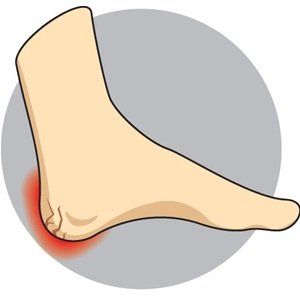Cracked Heels
In rare cases, it can lead to serious medical problems.
Who Do Cracked Heels Affect?
Cracked heels can affect anyone, regardless of gender and age and most of us will experience it once in our lifetimes.
People with certain medical disorders are more prone to experience cracked heels.
How Do Cracked Heels Occur?
Cracked heels develop over time. It begins with the development of dry thickened skin around the heel edges, known as a callus.
As weight is put on the callus by walking, small cracks become visible. When we walk, the subcutaneous fat pad in the heel expands and the added pressure causes the cracks to become deeper and more painful, resulting in cracked heels.
Causes of Cracked Heels
Cracked heels can be caused due to a number of factors and medical disorders. These include:
- Dry skin left untreated,
- Using soaps and skin products that result in dry skin,
- Dry weather such as cold winters and low humidity,
- Chronic systemic disorders such as hypothyroidism and diabetes,
- Psoriasis,
- Atopic dermatitis,
- Obesity,
- Occupations which result in standing for long stretches (particularly on hard floors),
- Shoes such as sandals and open back ‘thongs’, which provide little to no support to the fat pad, and
- Walking barefoot.
Symptoms of Cracked Heels
The symptoms of cracked heels include:
- Visible cracks on the heels,
- Complain of discomfort and pain when weight is put on the feet,
- In extreme cases, the patient can report bleeding on walking, and
- In cases of infection, there can be associated fever and pus formation leading to bad odour.
How are Cracked Heels Treated?
The treatment for cracked heels ranges from
- Prevention,
- Self-treatment, and
- Doctor prescribed medication.
Cracked heels can be prevented from occurring by keeping heels moisturized using skin care lotions and petroleum jelly based products once a day.
Insoles and heel cups that redistribute heel weight and give support to heels are also beneficial in some cases.
In cases of severely cracked heels with no improvement with bandages and self-treatment, you may consider:
- Debridement - the medical removal of dead, damaged, or infected tissue to improve the healing potential of the remaining healthy tissue
- Heel strapping, and
- Prescription medicine containing higher strengths of urea.
What if Cracked Heels are Untreated?
If cracked heels are left untreated, there can be severe pain and bleeding on walking.
In patients with compromised immune systems or diabetes, it can also result in infection (cellulitis) and diabetic foot ulcers which are of serious concern.






